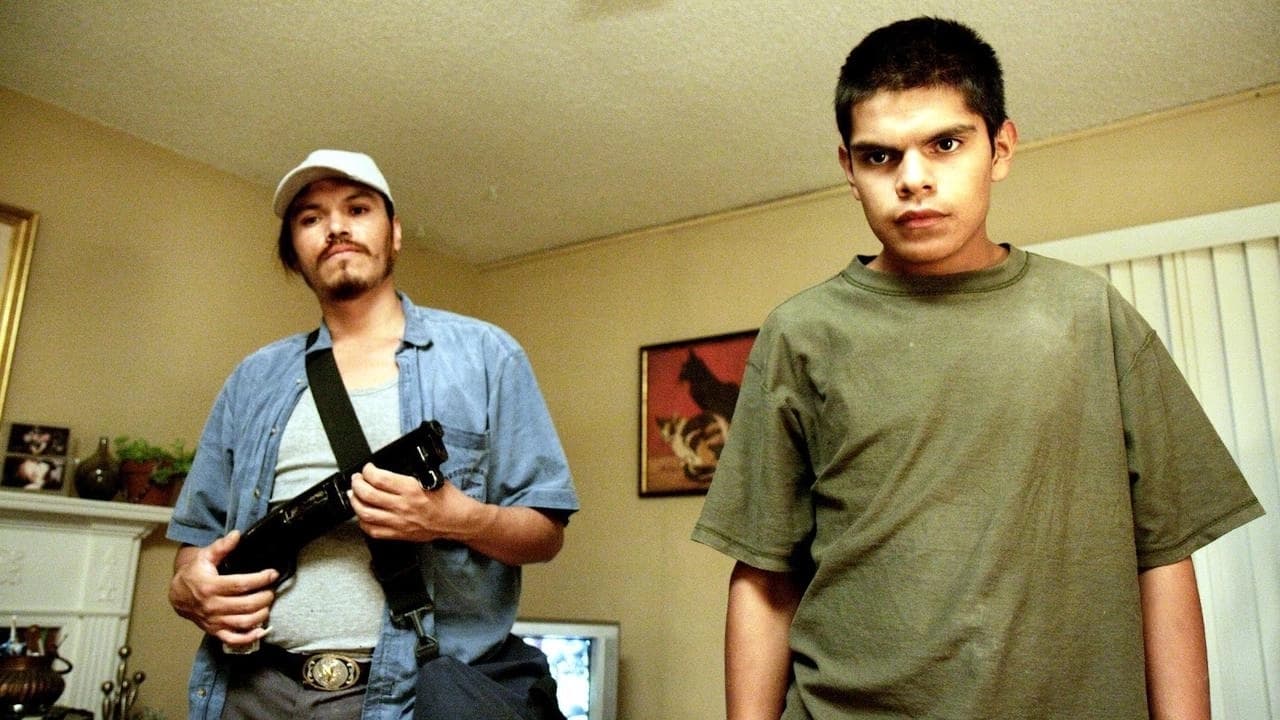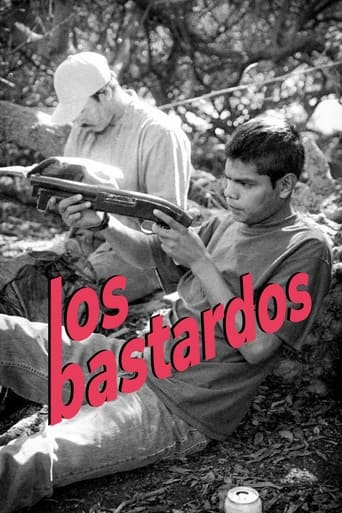

It’s sentimental, ridiculously long and only occasionally funny
... View MoreGreat movie. Not sure what people expected but I found it highly entertaining.
... View MoreStrong acting helps the film overcome an uncertain premise and create characters that hold our attention absolutely.
... View MoreThrough painfully honest and emotional moments, the movie becomes irresistibly relatable
... View MoreLOS BASTARDOS (dir. Amat Escalante) The film is an unflinching attempt to apply the principles of DOGMA 95, or something quite similar, and this starkly unconventional film succeeds very well. DOGMA 95 was a Danish film movement which was conceived as a reaction to Big Budget Hollywood films, and initiated new ways to tell a story with film. Lars Van Trier and Thomas Vinterberg, authors of the guiding principles, felt that the job of the modern filmmaker was to mirror reality as closely as possible-with Absolutely NO Frills. DOGMA 95 films would only use ambient sound-No Soundtracks, employ no fancy lighting techniques, use improvisational dialogue only, non-actors would be employed exclusively, and only hand-held camera work was allowed. LOS BASTARDOS begins with an opening shot of over three silent minutes in which the two lead characters walk into focus from far off in the distance. Most films attempt to ensnare the viewer immediately, yet in this film you feel that you are, 'waiting for something to happen'. The camera is used only to observe and record, and the story is allowed to emerge with no embellishments. A hired killing is the slim conceit of this film, and the film unfolds at a slow pace, and has the feeling of a documentary because none of the action could be confused with conventional acting. This film is not for everyone, but I would highly recommend it. Winner of numerous awards.
... View MoreAmat Escalante's 'Los Bastardos' (2008), which I had the pleasure of seeing at the Tate Modern in December 2009, fits into the existential 'buddy narrative' of films/plays like 'Rosencrantz and Guildenstern are Dead' and Samuel Beckett's 'Waiting for Godot'. The long opening shot is of a desolate urban landscape on the outskirts of Los Angeles, and shows two wandering figures in the far background. Escalante sets the scene for the film and introduces us to the broader social predicaments of the characters, who are illegal Mexican labourers in the United States.'Los Bastardos' opens slowly and the two main protagonists, Jesus and Fausto, don't come to the fore till at least halfway into the film. They have been contracted to kill an American woman. The woman's life is portrayed as rather drab. She lives with an uncommunicative and awkward adolescent son, with whom she can barely hold a conversation, and she seeks solace through drug use. When Jesus and Fausto break into the woman's home is where the narrative begins to unfold. 'Los Bastardos' is very similar, stylistically, to the German director, Michael Haneke's 'Funny Games' (1989) - Jesus demands food from the woman and she is constantly watched over with a shotgun. Whilst Haneke's film is very much a modern, dystopian fairy tale with the nice middle-class family being tortured and imprisoned by two sadistic sociopaths from nowhere, Escalante portrays believable characters in Jesus and Fausto. Jesus and Fausto are not 'natural' friends – Jesus is in his 30s, while Fausto is an awkward and reticent teenager. They are two people thrown together by their own social and economic deracination – neither of them can speak English; they are illegal aliens; and the very thing that has driven them to cross the US border – namely, money for a better life – is something they can only acquire in any substantial amount through killing another human being, whom they know nothing about.The incarceration of the woman is gruesome and harrowing to follow. Though the two Mexicans are not brutal to the woman, she is still their prisoner and when she is told to strip down to her underwear to go swimming with them, she takes on a clown-like character and adds an 'absurdist' element to the drama. The woman cannot speak enough Spanish to plead or bargain with her kidnappers, and they take advantage of home comforts such as food, swimming pool and TV whilst holding her captive. Escalante could be mocking passivity and consumerism when showing the kidnappers aimlessly lounging around in their victim's home indifferent to her basic humanity, but on the other hand they could be seen as taking advantage of what little comfort is available to them both in America and their home country.The narrative of 'Los Bastardos' in many ways becomes larger than the sum of its parts. Whilst a writer like Samuel Beckett was seen as hinting at the existential, philosophical alienation and deracination of post-war Europe in 'Waiting for Godot', Escalante's film opens up channels of discussion about the very real human and existential void created by irrational preoccupations in the Western world with issues such as illegal immigration and the notion of the 'economic migrant'. The United States is so determined to keep Latinos out that it is prepared to spend hundreds of millions of dollars on border security and perimeter walls. The inhuman consequences of these policies result in Latin Americans seeking even more dangerous routes, such as through desert, to get across the border leading to tragic consequences for those who perish at the cruel hands of nature.There is no proper debate about immigration in America or Europe. The real human issues are ignored and immigration is reduced to a merely economic and technical problem of numbers – albeit, a very expensive one in terms of the social and financial expenditure required to contain it. The ingenuity of Escalante's film is that it makes us think about what is happening in front of us. He avoids endowing the film with an explicit social message, but you can't watch and fully appreciate a film like 'Los Bastardos' if it doesn't make you question why these things happen to people and why it is wrong.
... View MoreLos Bastardos is a film about two very lonely Mexican immigrants in Los Angeles, who are forced to spend the evening with an even lonelier American woman, under extreme circumstances. Enter Jesús and Fausto, in the first shot they are seen walking for over four minutes, Fausto, the youngest is playing with a soccer ball which he leaves behind at the end of the shot, this could represent the fact that he's leaving behind his innocence for on that day they have been hired to kill someone. The plot always makes people think this is a fast paced thriller, or a "Funny Games" type ordeal, but no. The film plays like a Carlos Reygadas movie, once there is an action there is no reaction, but contemplation of the moment. This gives the spectator time to ponder and let the feelings sink in, particularly about the life-style of Mexican day-laborers which is something very depressing to watch. The story is taken at a very slow pace, and every turn leads to something unexpected, and the use of non-actors makes the situations feel very authentic and even logical, as though they could in fact happen in that order. The amount of realism is accentuated by scenery of Los Angeles, beautifully photographed. So yes, this is a deliberately slow film but it builds emotion with its pace only to destroy one's emotions at the end. The camera language speaks to the audience, this is a very well directed film. In the end, I thought this was the kind of cinema I needed at the time, and I could see it again to analyze the amazing photography and the fascinating pace. Its a very peculiar type of cinema, but its so well made and has such profound emotion that if it falls short of masterpiece its because we are not used to a film being so determined to be so casually profound.
... View MoreLos Bastardos offers a sharp view of some of the realities of America and its "lower class citizens". Director/writer Amat Escalante certainly has things to say but unfortunately, his narrative is stretched and the pace becomes contemplative and somewhat aimless. We sense a lot of sincerity in the movie, particularly the first half as we follow Jesús and Fausto and their lives as illegal workers. But even then, the viewer will have to sustain interest throughout long, static scenes and few lines of scripts. Most of the actors seem to somewhat improvise their lines, adding to a sense of documentary. There's no sense that these are Oscar-material actors but rather real people, which breathes a sense of reality.What was already an overly stretched movie takes a turn for the worse in the second half, where the slow pace halts to a crawl. Most people will have already mentioned the famous "shocking scene", which I do not find that shocking, just gruesome. You get the feeling much of the interest/acclaim for this film was drawn from that scene which I find unfortunate. Amat Escalante is a name to remember for the sincerity put in this movie, the visceral nature of this work but I can't help but think he's a better director than writer and that shooting other people's script might be the way to go for him. Los Bastardos may be worthwhile if the synopsis drew your interest and if you are an attentive viewers but do not expect a masterpiece. This is a below average movie that needed a more fleshed out story.
... View More